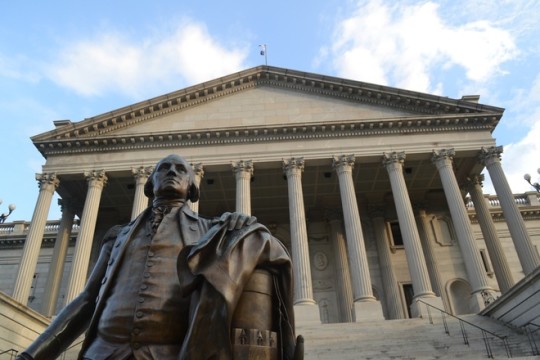
By RICK BRUNDRETT
Allowing Union County Transportation Committee members to make up to $750 a year – paid out of state gas-tax money – is too costly for taxpayers, says a co-sponsor of a bill that would pay those members for attending regular meetings.
“It is high,” said Rep. Bill Clyburn, D-Aiken, when contacted Monday by The Nerve about the County Transportation Committee (CTC) pay. “It looks like they’re making a profit out of the meeting.”
Although he is the bill’s sole co-sponsor, Clyburn, whose House district doesn’t include Union County, said he wasn’t aware it allowed those CTC members to be paid $75 per meeting for attending up to 10 meetings in a fiscal year. He said he doesn’t oppose reimbursing committee members – who are appointed by that county’s four-member legislative delegation – for mileage to meetings.
Clyburn said the bill’s author, Rep. Doug Gilliam, told him a purpose of the bill was to help bring “some uniformity” on meeting pay compared to other parts of the state, noting that according to the Union County Republican, “These people come to these meetings; and some are paid, and some are not paid.”
Gilliam did not respond to a phone message Tuesday from The Nerve seeking comment.
Gilliam’s bill isn’t the only legislation so far this year dealing with CTC pay out of county “C” fund revenues, which come from 3.325 cents of the state gas tax per gallon, and will increase to 3.99 cents per gallon next year. The CTCs determine which local road projects to fund with those revenues.
And it illustrates another power of county legislative delegations, which appoint most county CTCs statewide. The Nerve last year, for example, revealed how one senator in 12 counties can control the appointment of that county’s magistrates.
Under state law, legislative delegations can make project recommendations to their respective CTCs.
A pending bill sponsored by Sen. Vincent Sheheen, D-Kershaw, would hike meeting pay for Kershaw County CTC members from $75 to $90 per meeting, and also would increase the number of meetings in a fiscal year eligible for payments from 15 to 18. Under the proposal, total maximum pay for each CTC member would jump to $1,620 per fiscal year.
In addition, the committee’s chairman would be paid $175 per meeting, or a maximum $3,150 yearly based on 18 meetings, under the bill.
Sheheen didn’t respond to phone and written messages Tuesday seeking comment. The county’s seven-member legislative delegation appoints CTC members.
Another bill sponsored by Sen. Gerald Malloy, D-Darlington, would pay Lee County CTC members $100 per meeting for up to 15 meetings per fiscal year, or a maximum total of $1,500. The legislation also would make the chairman of the county’s three-member legislative delegation, which appoints the CTC, an ex-officio, nonvoting CTC member.
Malloy did not respond to written and phone messages Tuesday seeking comment. Asked Tuesday if the proposed meeting pay was too high and whether members should be reimbursed for mileage only, bill co-sponsor Sen. Thomas McElveen, D-Sumter, replied, “I think that’s a fair point to make,” adding, “There are a lot of areas in this state where people serve and don’t get anything.”
CTC members in McElveen’s home county of Sumter do not receive meeting pay, according to McElveen.
Asked if adding the Lee County legislative delegation chairman to the county’s CTC would allow that lawmaker to receive meeting pay under the bill, McElveen replied, “That’s a legitimate question,” though he didn’t know the answer. He said no delegation members currently serve on the CTC, and that the delegation doesn’t have an assigned chairman.
Still, McElveen said he doesn’t believe that “$100 per meeting is anything that’s going to offend most people,” noting CTCs in general deal with “pretty substantial amounts of revenue,” and that committee members typically invest “substantial time” with their positions.
More than $86 million in base “C” funds was allocated, based on a state formula, to 46 counties last fiscal year, which ended June 30; about $96.5 million is projected for this fiscal year, according to the S.C. Department of Transportation’s annual “C” fund report to the Legislature.
Both the Lee and Kershaw county CTC bills were introduced on Jan. 14 and placed on the Senate’s uncontested calendar; each bill received a second reading Tuesday and could be sent to the House this week. Rep. Will Wheeler, D-Lee, is the only member of the House’s Lee County delegation; he also makes up the House’s four-member Kershaw County delegation, which includes House speaker Jay Lucas, R-Darlington.
The Union County CTC bill, which was prefiled in December, was approved last month by the county’s House delegation – Rep. Gilliam – and passed the full House by a 78-3 vote after Rep. Jonathon Hill, R-Anderson, who voted against it, requested debate.
The bill was referred to the county’s Senate delegation, which includes Senate president Harvey Peeler, R-Cherokee; and Sens. Shane Martin, R-Spartanburg, and Ronnie Cromer, R-Newberry. If passed by the Senate, the bill would go to Gov. Henry McMaster, who will decide whether to veto it.
Brundrett is the news editor of The Nerve (www.thenerve.org). Contact him at 803-254-4411 or rick@thenerve.org. Follow him on Twitter @RickBrundrett. Follow The Nerve on Facebook and Twitter @thenervesc.
Nerve stories are free to reprint and repost with permission by and credit to The Nerve.
